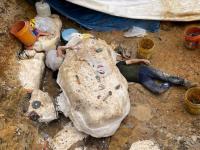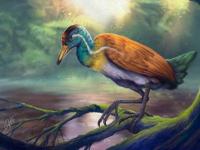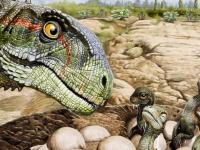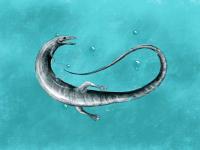Scientists Take to Twitter to Share What They Sacrificed in the Name of Science

Scientists reflect on what they sacrificed in their pursuit of science.
Choosing a profession in the sciences is one of the most exciting, yet challenging choices a person can make. Most choose it in the pursuit of knowledge - unable to live without the answers, so they go out and find them. It is a difficult, rather unglorified job. Scientists sacrifice countless hours and dollars to further their understanding of basically, everything. But it is far from the only sacrifice scientists are willing to make in the name of science.
Dean Lormax, a paleontologist passionate about science, understands some of those struggles. At the age of 18, Lormax new his passion was with paleontology - the science of fossilized animals and plants. However, participating in his first dig meant selling his prized collection of Star Wars memorabilia.
Lormax, now a well-respected paleontologist in the science community, reflected on his sacrifice for science a decade later.
“As a paleontologist, I get to work on some incredible projects, but it’s taken so much to get to that stage,” Lormax explained. He added that in his pursuit of science he has sacrificed his health, sanity, social life, and finances have all suffered.
However, Lormax is far from the only one to make such sacrifices in the name of science. In a tweet he made late April, Lormax shared his story on Twitter and asked his followers what they too have sacrificed to pursue a career in science.
Hey, #scientists I'm intrigued.
I sold my childhood #StarWars collection to fund my first professional dig - a decade ago. #geek #scientists I want to know what sort of things you've had to sacrifice in order to pursue a career in science? #SacrificeScientists
— Dean R. Lomax (@Dean_R_Lomax) April 24, 2018
Since the tweet went live, many scientists have come out to share their struggles as well.
As most will experience, money is likely the first thing most will have to sacrifice to begin their journey to becoming a scientist. ReBecca, a Twitter user who responded to the post, described the crippling debt she entered to be able to make enough money and pay for school.
Massive student loan debt till I’m in my 60s. Missed most of my daughter being 3 to drive 200 mi/day to my new job. Husband gave up his job/work stability to move so I could have a “real job.” Self funding all meetings. All “vacations” revolve around fossils/paleo meetings
— ReBecca HF (@paleochick) April 26, 2018
The time commitment of becoming a scientist is another thing scientists must be willing to give. While other quickly move along with their degrees, scientists often stay in academia much longer. Elsa Panciroli shared her story on what she sacrificed for science.
Everything! Started again from scratch in late 20s., but also watching my friends buying homes, rising to top job positions, settling with families... , but I'm still *just* a student.
Worth it to pursue something I love though.
— Elsa Panciroli (@gsciencelady) April 25, 2018
Diva Amon, another one of the scientists to share her story described the hardship she experienced spending so much time away from the things she loved.
Years and years of time with family and friends, not to mention a handful of boyfriends. Being an international student & then moving countries twice for postdocs is enough of a sacrifice but then there are the hours, the money, some of the skin off my foot.... the list goes on!
— Diva Amon (@DivaAmon) April 24, 2018
Getting results is tough, especially in the tight timelines demanded by companies. Deadlines come quickly, and good data does not. Keeping investors interesting is notoriously difficult; results must come quick enough and must be good enough for further funding to be released. Even more troubling is ensuring investors stay interested long enough to see the results. Dr. Lisa Buckley explained how pursing science left her with the constant fear of stability.
How timely! Security and stability were sacrificed in the name of "hoping" our funding situation would improve "next year." It has been a decade of "hoping for next year" now. There's enough data to demonstrate that "hoping" isn't working.
— Lisa Buckley, Ph.D. (@Lisavipes) April 24, 2018
Others, like Jade, shared their more sorrowing stories. Also a victim of science, Jade made the difficult decision to leave the country in the pursuit of furthering her education. As a result, she never made it home to say goodbye to her grandparents.
When one of the most important people in my life was dying, I was in the process of applying for a visa for my first postdoc. Getting on an international flight to say goodbye would disqualify the visa application and bar me from that country for 10 years.
I chose the job.
— Jade (@vertigopostdoc) April 27, 2018
While some give up their last moments with family, others put starting a family on hold for many years until they are stable again. Anna shared her story of how she put off having a family until she finished her degree.
For my PhD I moved 10,000 km from home, far from my family and friends. But what I feel is my biggest sacrifice now: I would have become a mother many years ago if I had a normal job back home. With all the uncertainty I don't know if I'll ever be able to have children at all.
— Anna SdTC (@annasdtc) April 25, 2018
Becoming a scientist is no easy gig. There are countless hours spent figuring out how data fits together, and countless more trying to figure out what to do next. Things often go wrong and things must be sacrificed in order to make deadlines. It sounds quite horrible, and it can be - sometimes.
But sometimes a little blood, sweat, and tears is what it takes to ensure humanity is always progressing. It is up to scientists to make tomorrow better so everyone else can have a better today. It is the kind of forward thinking which drives humanity forward together.
It is not without struggle, and it is far from glorious. It is often ugly, dirty, and requires many, many sacrifices. But in the end, being a scientist is one of the most gratifying jobs in the universe - and most would do it again, and again, and again.
Humanities constant desire for something better will always be filled by scientists - as long as they are willing to make the sacrifice.
Via: Nature Index








